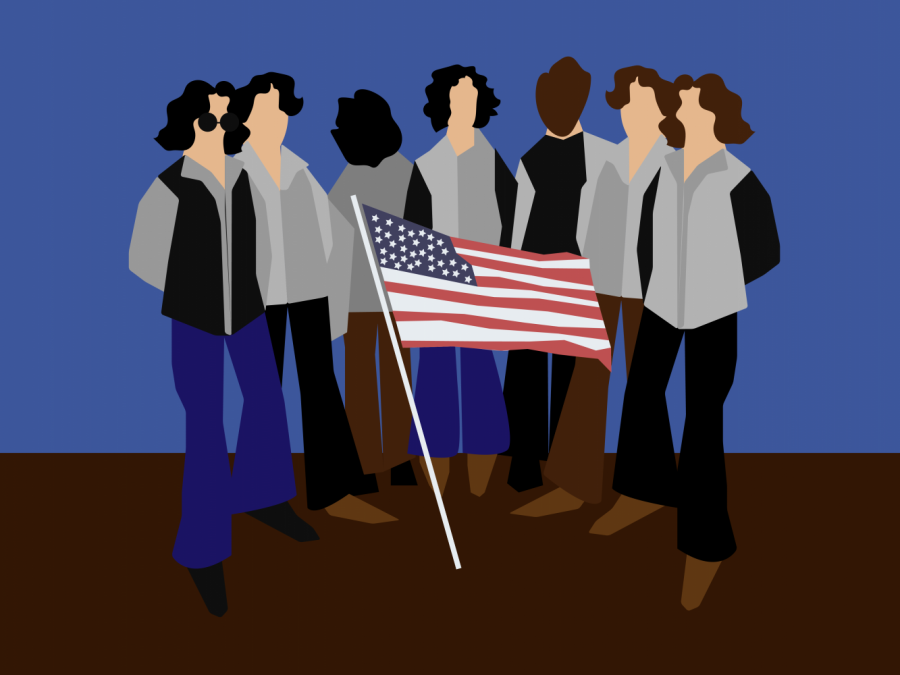In 1968, seven protesters were put on trial for inciting a deadly riot at the Democratic National Convention in Chicago. It was arguably one of the most dramatic and significant cases regarding civil rights that the nation has seen. Fast forward about 50 years, and similar waves of social unrest have raised debates about police brutality, racial activism and the public’s right to protest. Aaron Sorkin could not have picked a better time to make “The Trial of the Chicago 7.” His film forces us to reflect on injustices of the past, and consider solutions in the present. However, the message is packaged in a hot mess of a movie that is funny in a “laugh at it” more than a “with it” kind of way.
Sorkin’s signature fast-paced, witty dialogue works against itself throughout the film, as it creates a bizarre dichotomy between the intensity of the situation and this satirical, witty humor. Every character is based on a real person but the punchy dialogue packed in every exchange creates an underdeveloped caricature of themselves. The tragedy of the film is not that it is truly awful, but that it should be so much better.
The film begins on a strong note, showing a clip of the real Lyndon B. Johnson’s announcement to continue the war in Vietnam and increase the draft. A variety of archival shots of the war and the draft follow, with short compilations of footage shot for the film flawlessly weaved in. The camera then pans out of a Vietnamese school being napalmed to introduce some of the main characters: Tom Hayden (Eddie Redmayne) and Rennie Davis (Alex Sharp). They are rallying people to protest at the DNC in Chicago.
The mood quickly shifts to show comic duo Abbie Hoffman (Sacha Baron Cohen) and Jerry Rubin (Jeremy Strong) doing their political stand-up routine regarding the trial, which acts as a way for the audience to digest events in the film. From the first moment you see Tom Hayden, it becomes clear that he is the serious student type, while Hoffman and Rubin use ridiculousness as a way to conceal their intelligence, making themselves more relatable to their peers while spreading the importance of their messages. Hoffman’s stand-up, although somewhat out of place at times, is used as a way for him to relay his perspective and guide the audience through the sequence of events, offering much needed levity.
As Sorkin gets into the depiction of the trial, it all becomes too much. From the first minute, Judge Julius Hoffman’s (Frank Langella) incompetency is established through his inability to remember the names of the lawyers and his denial of representation to Bobby Seale (Yahya Abdul-Maheen II) because of his racist tendencies. This is not to say that the judge wasn’t controversial in reality, but the film exaggerates it to an unrealistic degree. In his prior works, Sorkin had no problem straying from reality in order to establish a dramatic flair. Given the sensitive and significant subject matter at hand, his style clashes with the real events the film is portraying. The result feels like pure fiction.
Later in the film, Sorkin decides to present Hoffman as the villain of the film, making the defendants the good guys, which feels like an oversimplification. Sorkin goes on to reduce the complexity of this trial into your classic Hollywood blockbuster formula. From the shiny, even glamorous protest shots to the “a-ha!” lawyer savior moments, everything is watered down to fit into Sorkin’s fictitious narrative, which is borderline offensive. Ultimately, this undercuts the complexity of the real-life civil rights movement.
Even the iconic Abbie Hoffman monologue that has gone down in history as being one of the most eloquent speeches about our nation’s problems was rewritten in the film to say “I think the institutions of our democracy are wonderful things, that right now are populated by some terrible people.” Understandably, Sorkin wants to put his own twist on the characters and storyline, but believing he can write a better line than the person he tries to honor feels arrogant and self-indulgent.
Many of the film’s problems could have been avoided if Sorkin was not acting as the writer, director and screenwriter. As the screenwriter, he makes it a point to stick to the script, which makes the film seem mechanical rather than genuine. You would be hard-pressed to find a single organic moment throughout the film. Even the conflicted prosecutor Richard Schultz (Joseph Gordon-Levitt) embodies the trope of the brooding, morally ambiguous lawyer.
When Schultz stands to honor the fallen soldiers in the final scene, one can almost see Sorkin squeezing every last drop of emotion from the audience in what can only be described as a laughable cliche. Then, everyone stands and claps as the judge bangs his gavel to establish order. As the “where are they now?” credits roll over the scene, it is difficult not to reflect on how soulless the spirit of the film feels in comparison to the revolutionary zeal of the people it portrays.
“The Trial of the Chicago 7” should be more than Sorkin’s attempt at “social justice” through the rose-colored glasses of Hollywood. In fact, its ability to gain as much critical acclaim as it has says a lot about the Academy and their obsession with appearing diverse. In reality, they continue to promote watered-down and unrealistic depictions of history for the sake of comfort.
While Sorkin used an incredibly moving subject to secure himself a nomination, his attempt to depict such a complex series of events fell short, leaving us to wonder, disappointed, about what could have been.
Email Julia Gastone at [email protected]























































































































































